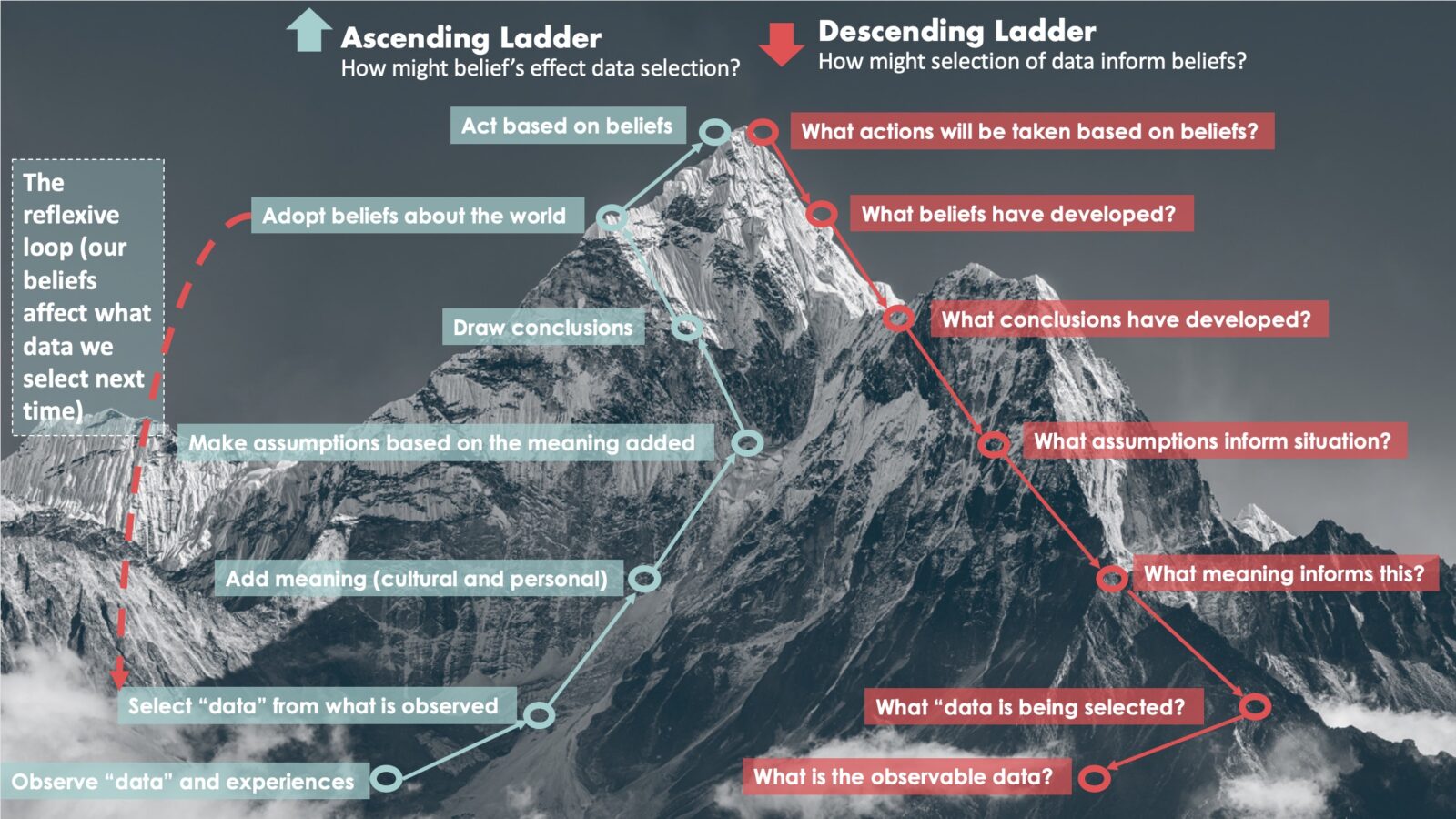 Introduction: The Perils of Perception
Introduction: The Perils of Perception
Picture this: you’re Sherman McCoy in The Bonfire of the Vanities, desperately navigating New York’s dark alleys. Your surroundings, fears, and preconceptions intertwine, leading to dire consequences. This moment, though fictional, is a stark illustration of how perceptions, often distorted, drive our actions in critical situations. In leadership, recognizing and understanding this process is essential. This is where the concept of the Ladder of Inference Harvard Model comes into play, a tool crucial for effective decision-making and leadership.
Understanding the Ladder of Inference Harvard Model
The Ladder of Inference Harvard Model, was developed by Chris Argyris, an esteemed Harvard organizational psychologist, outlines the steps we unconsciously take when making decisions. It starts with observing data and experiences and culminates in taking action based on our interpreted reality. The challenge? We often skip the first rung, jumping straight into selecting data that aligns with our pre-existing beliefs and biases.
The Seven Rungs of Decision-Making
- Reality and Facts: This foundational rung involves observing the data and experiences directly available to us.
- Selected Reality: Here, we unconsciously select specific observations from our reality, influenced by our existing beliefs and experiences.
- Interpreted Reality: At this stage, we interpret the selected data, attaching personal meanings and interpretations.
- Assumptions: From our interpretations, we begin to form assumptions, often extrapolating beyond the data.
- Conclusions: These assumptions lead us to draw conclusions, solidifying our interpreted reality into more concrete beliefs.
- Beliefs: Our conclusions then evolve into beliefs, which are the convictions we hold as a result of this process.
- Actions: Finally, our actions are taken based on the beliefs formed through the previous steps of the ladder.
The Reflexive Loop: A Trap for Leaders
A critical aspect of the Ladder of Inference Harvard Model is the reflexive loop. Once beliefs form, they shape the data we notice, creating a cycle that reinforces our existing worldview. This loop can be either virtuous or vicious, hinging on the accuracy of our beliefs and our openness to challenging them.
Testing Your Beliefs: Climbing the Ladder Mindfully
Leaders must ask probing questions to ensure they’re not climbing the ladder with blinders on. Consider questions like: “Are we dismissing facts that don’t align with our beliefs?” or “How might our biases be skewing our decision-making?” Inviting diverse perspectives and rigorously testing assumptions are key steps in this process.
Applying the Ladder of Inference Harvard Model on Decision Making in Leadership
- Start with Facts: Before drawing conclusions, thoroughly review the facts at hand.
- Embrace Cognitive Diversity: Diverse viewpoints can significantly enhance decision-making quality.
- Test Interpretations: Regularly challenge your own and others’ interpretations to avoid misconceptions.
- Utilize Inquiry: Employ inquisitive approaches to dismantle flawed reasoning.
- Multiple Perspectives: Ensure you’ve evaluated the issue from various angles for a more rounded understanding.
Real-World Impact: Statistics and Case Studies
- Improved Decision-Making: A study by McKinsey found that companies with diverse executive boards outperform peers in profitability by 33%.
- Reduced Bias: Harvard Business Review reports that inclusive decision-making processes lead to better business decisions 87% of the time.
- Enhanced Innovation: According to BCG, companies with diverse management teams have 19% higher innovation revenues.
The Leader’s Journey on the Ladder of Inference Harvard Model
Navigating the Ladder of Inference is not just about avoiding missteps; it’s about cultivating a culture of thoughtful, inclusive decision-making. It demands constant vigilance against biases, an openness to diverse perspectives, and a commitment to grounding decisions in reality.
As leaders, embracing this model means not only making more effective decisions but also fostering a more inclusive, innovative, and successful organizational environment. Are you ready to climb the Ladder of Inference with intention and insight? CO2 Coaching offers executive coaching services to guide you on this transformative journey.



